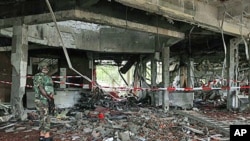Suspected terrorists on trial in Nigeria say their group, Boko Haram, is recruiting fighters to avenge the death of their leader while in police custody.
Meanwhile, Nigerian government hopes of starting talks with the Islamic sect are fading as security forces step up their pursuit.
President Goodluck Jonathan recently announced plans to open talks with Boko Haram, the Islamic militant organization which has claimed responsibility for a series of bombings and shootings across northern Nigeria and in the capital.
A member of the government committee appointed to start negotiations says those efforts are now being overtaken by a harder-line approach following Boko Haram's bombing of U.N. headquarters in Abuja last month, which killed 23 people.
Magistrates on Tuesday charged eight men with bombing an electoral office, a political rally, and a church in March and July. The charges carry a sentence of death by hanging. All of the men pled not guilty.
One of the defendants, Ahmed Hassan Ezemako, told the court that he was recruited by Boko Haram to avenge the killing of its leader, Mohammed Yusuf, who died in police custody two years ago following violence in the city of Jos.
Turning point
Five police officers are on trial in connection with Yusuf's death, which marked a turning point for the sect. University of Abuja sociology professor Abubakar Umar Kari says the militancy that followed Yusuf's killing set back efforts to open talks.
"These people went further underground, regrouped, restrategized, and they bounced back and became such a menace that they now could threaten the very existence of the Nigerian state," said Kari.
Kari says the group's fundamentalism appeals to popular dissatisfaction with Nigerian life. "Boko Haram's existence and spread owes directly to the inability of the Nigerian state to address basic, fundamental problems of Nigerian citizens. Problems of security, problems of employment, problems of poverty alleviation and so on and so forth. So that is why it is very easy to recruit,” said the professor.
Retired Lieutenant General Jeremiah Useni heads a prominent group of religious and political leaders in northern Nigeria, an association known as the Arewa Consultative Forum. He says President Jonathan should not turn his back on talks with Boko Haram.
“In a situation like this, you try any way possible," he said. "There are those who think the government should dialogue with Boko Haram and those who say, 'No. Those are rogues. These are people who are killing. How can you sit and dialogue with them?' There are divided views. I don't blame the government if appeals fall on deaf ears. If it is dialogue that will work, why not try it?”
Hopes for talks
With Nigerian security forces this week boosting patrols at universities, embassies, and government offices, sociology professor Kari says it is clear that prospects for negotiations with Boko Haram are fading.
“These people are not ghosts," said Kari. "They are not some spirits from outer space. They are Nigerians. Some of them are actually known. And to me there are ways of reaching out to them to talk to them. But instead of doing that, the Nigerian state mistakenly, and, it has now turned out, disastrously attempted to annihilate them.”
Boko Haram says it is fighting for an independent, Sharia-led nation in northern Nigeria and recognizes neither the federal constitution nor this year's election of President Jonathan.














